How small-scale waste-to-energy biogas converters are saving the environment and giving life to rural communities.
Massive energy projects are often focused in urban areas, this widens the energy gap experienced by those who live in rural areas, who can be left behind. This demands a look into smaller-scale projects that aid rural communities with their energy needs while also moving to a greener South Africa.
Prof. David Tinarwo, an Associate Professor in the Department of Physics at the University of Venda and the leader of the Biogas Research team, says, “As a university we looked at our surrounding communities and we saw that they relied on wood fire for heating and cooking. This drove a demand for cutting down trees in an unsustainable manner, and the actual burning of the wood was inefficient.” This observation led to a multi-phase project starting in 2013 where the university under Prof Tinarwo’s team, began looking into the use of small-scale waste – to – energy biogas converters that would bring energy and control to the people of rural Limpopo.
Rural areas and their needs
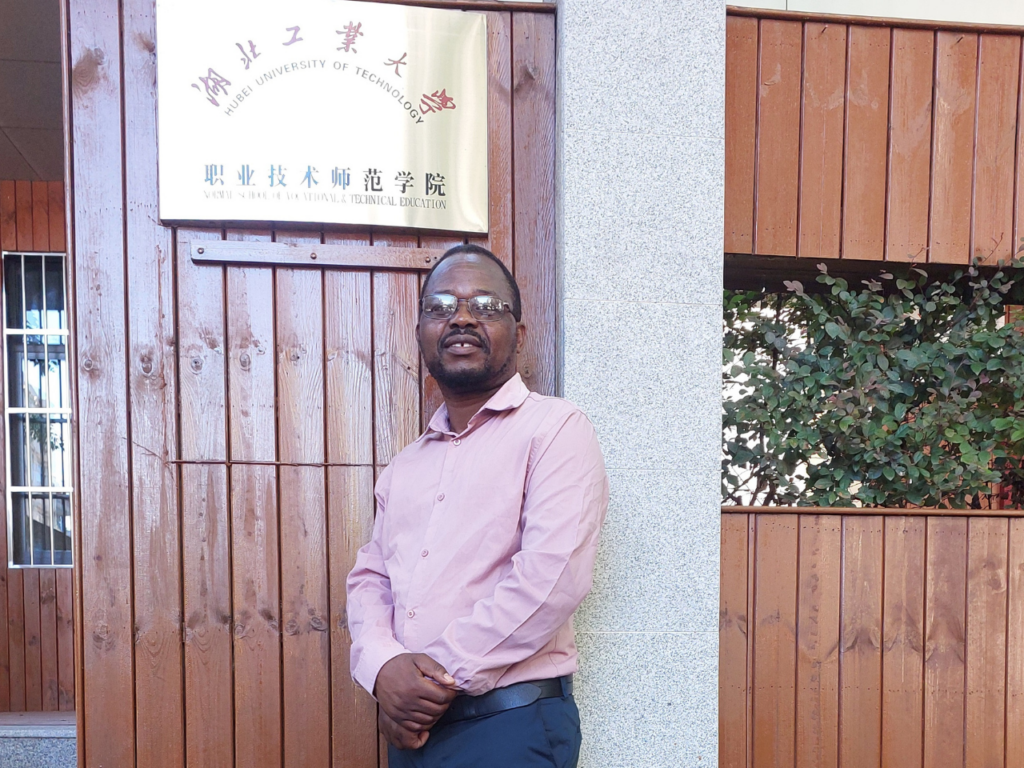
Prof. David Tinarwo, an Associate Professor in the Department of Physics at the University of Venda
“There was a real need to work with rural communities, we did not want to impose our environment-driven needs onto them but rather meet the communities where they were and work with them to help them empower themselves,” says Prof Tinarwo, “we identified the key problems they faced and turned them into actionable items.” Their inquiry found that rural communities in South Africa have the following characteristics:
- They lack access to reliable energy sources.
- They have high levels of agricultural waste.
- They have a need for sustainable agricultural practices.
- The communities stressed the importance of rural economic empowerment.
This is against the backdrop of these statistics from Stats SA (2021)
- 6% use wood as an energy source in Limpopo
- 4% unemployment in Limpopo (2021).
- 2% of households in Limpopo are involved in some form of agricultural activity.
With this background, the University of Venda’s biogas team sought to tackle the following:
- Improve household income,
- Improve food security,
- Improve cooking/heating energy
- Improve access to clean water
- Mitigate and adapt to climate change effects.
To achieve this, the project established “a spirit of knowledge sharing, and co-creation among stakeholders and communities.”
A unique problem brings a unique solution
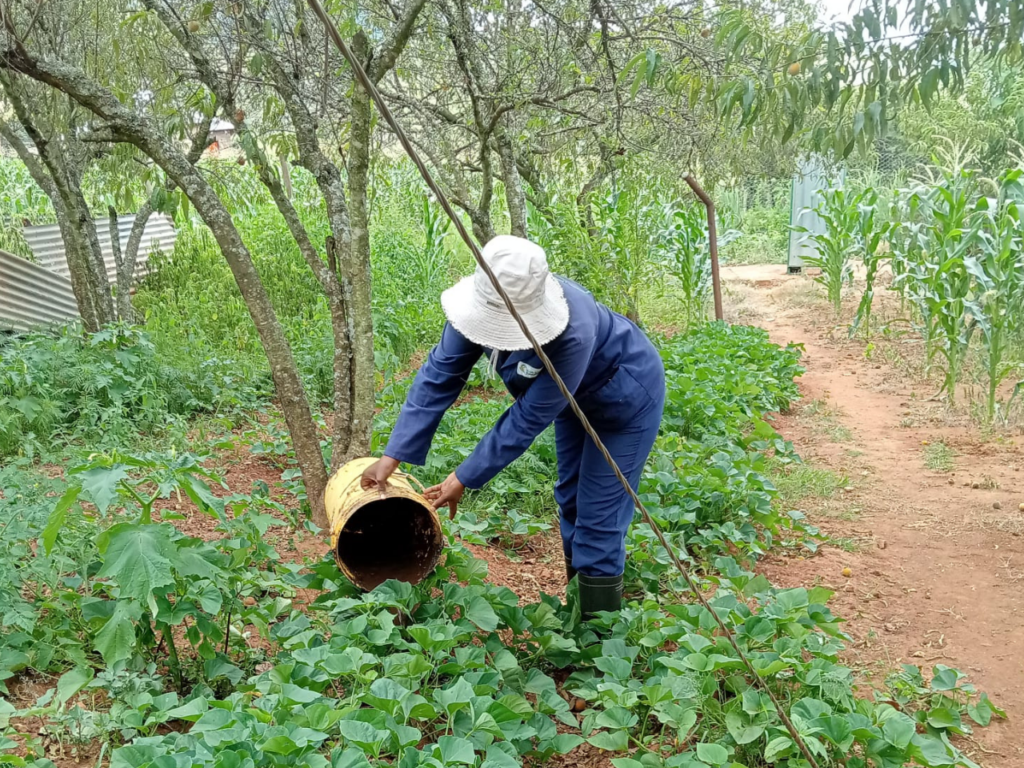
A byproduct of the digester is bio slurry which acts as fertiliser for subsistence farming, giving communities a source of income or food source
The problem of rural communities producing a large amount of agricultural waste turned out to be the silver lining, as Prof Tinarwo puts it, “Their problem was also the solution. Their agricultural practices, which are largely subsistence, led them to sit with an untapped fuel. Manure from piggeries, livestock farming, and husbandry is easily converted into a useful fuel that is sustainable and cost-effective.” Using biogas converters to create energy and fertiliser served both the energy and economic needs of the identified communities, and the University of Venda insisted that this project cannot be a ‘gift’ rather it must be brought to life in tandem with the communities they intended to serve. Prof Tinarwo explains that phase one of this project was extensive community engagement, “we visited households, schools, and early childhood development centres where they had a need for energy- either to heat or cook or both- and a need to develop their farming efforts. We had to make it clear that this project was going to help, and possibly provide income or save money.” Community engagement has been a unique driver in South Africa where involving communities in projects has resulted in higher project successes. Once the communities were behind Prof Tinarwo’s team, the next hurdle was funding- something he says “is always difficult at the beginning.” Their first round of funding came from the National Research Fund, which funded the practical demonstration of this technology as a partnership between the University of Venda and the University of Cape Town. This phase of the project started with a single 6 m3 biogas converter being installed at a creche that turned chicken droppings into gas for cooking and fertiliser for growing vegetables. “We needed a simple proof of concept, so we took the idea of a biogas converter and plugged it into the rural community. We started with a creche, this filled a direct need and as a pillar of the community it also served to show the benefits to the community.” This digester was a success, and shortly afterwards the Water Research Commission (WRC) gave additional funding for the project, where another converter was installed at a cooperative. This cooperative used cow dung- something readily available to them- to run boilers, which were used to clean chickens after slaughter, and other water heating needs.
“The success of these first two digesters really spurred us on, we applied for additional funding from the Limpopo Economic Development, Environment, and Tourism Department (LEDET) which saw another digester being installed at the University of Venda.”
Localising the solution
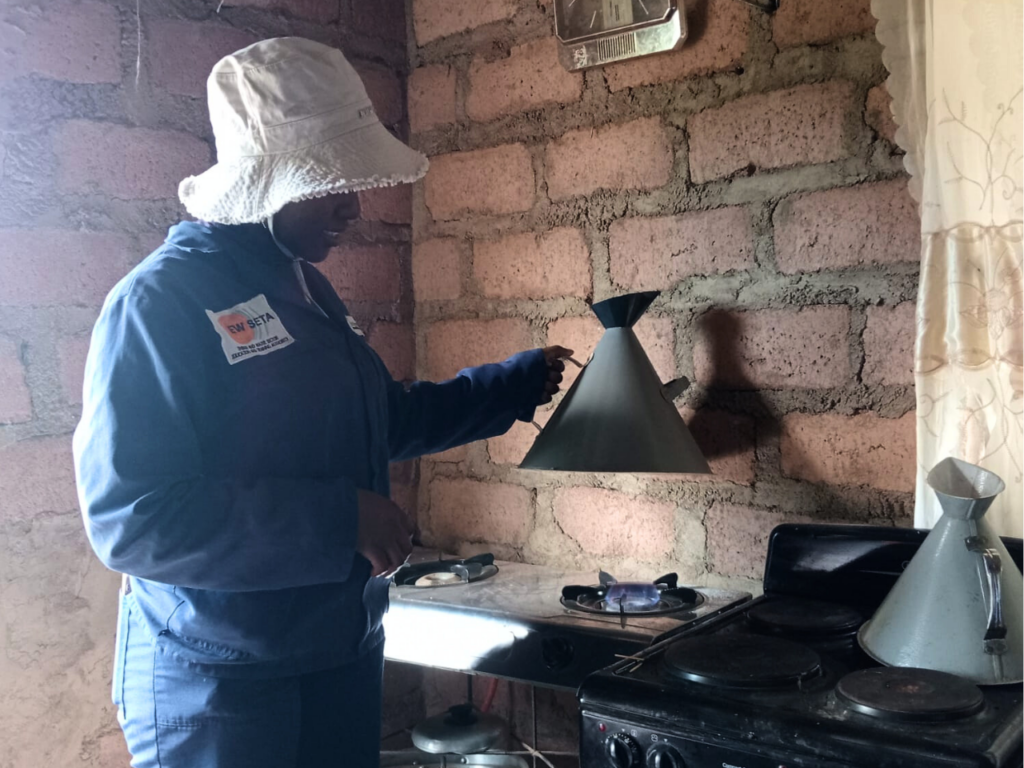
An intern funded by the EWSETA demonstrating the clean flame from the biogas that this household can now rely on
At this stage in the project, all the digesters were pre-fabricated and brought to Limpopo, which was costly and cut out of local labour and suppliers. “At the beginning of the project, we were concerned with demonstrating that they work, now that we have that proof, we had to confront the problems we had, which were that it was impractical and expensive to transport these converters to Limpopo. Since economic empowerment was a cornerstone of this project, we knew we had to localise the labour, materials, and knowledge,” explains Prof Tinarwo. What the team ended up doing was adopting a spherical design that is built underground using bricks and cement, this meant that the digesters can be made using local supplies and local labour.
“This localisation meant we had to ensure the necessary skills were available to the community. We compiled a course that would teach local youth to build, run, and maintain these digesters. We secured a further R300 000 funding from LEDET that would buy the materials for the digesters, and provide a stipend for the trainees.”
The first intake consisted of ten youths, nine male and one female. The training program is theoretical and practical and resulted in the construction of nine digesters across four sites. The training gave them the skills and real-world experience that guarantee them a skill, and with the project’s goals, could lead to full-time employment. The training consists of 13 modules, which go through the need that these biogas digesters serve, the theoretical building process, and end with a supervised and an unsupervised build. Each build was then tested for water and air tightness, crucial to the digester’s functionality.
The snowball effect
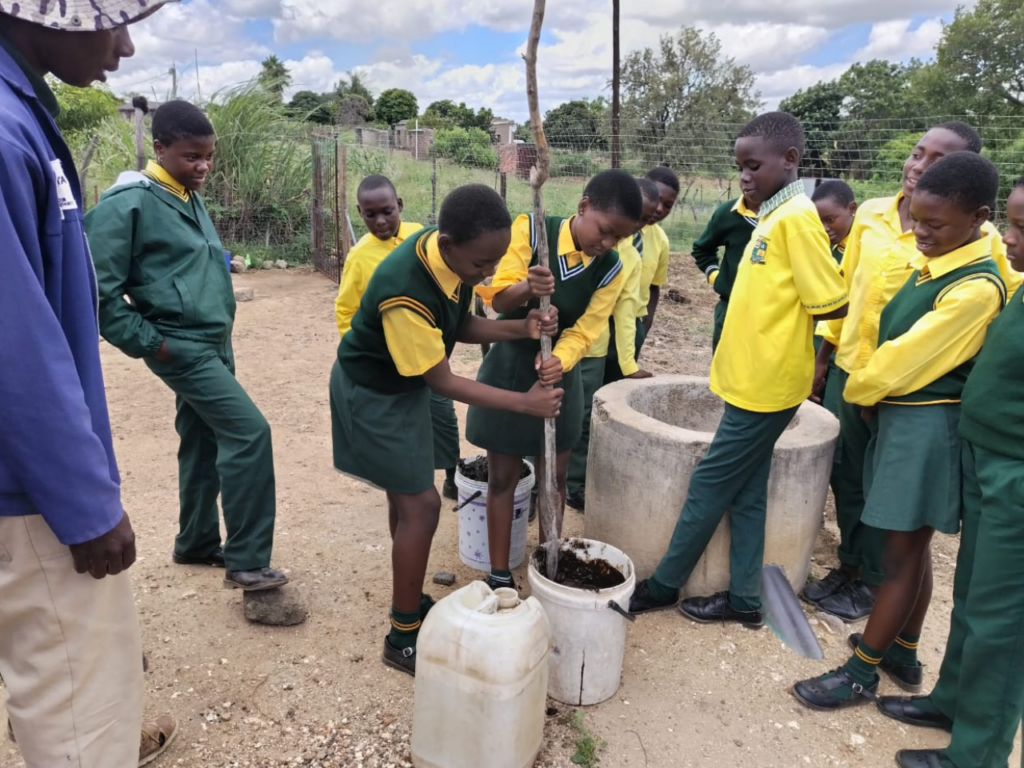
School children feeding the digester, which will help their school
The success of this training along with the waste – to – energy biogas converters in use led to a wave of interest and funding:
- United Nations Industrial Development Organization (UNIDO): R2 000 000
- South African National Energy Development Institute (SANEDI): R800 000
- Capricorn District: R1 400 000
UNIDO saw the potential in these digesters for use across Africa and was interested in upscaling. Prof Tinarwo says, “They wanted to upscale but we urged them to see it from our perspective, having multiple smaller units made it easier to build, and maintain as well, it gave the user the power rather than a centrally managed bigger unit.” UNIDO saw fit to fund the project with $181 000 (roughly 2 million rand in 2014) which would give 50 youths in Limpopo training and a stipend as well as 20 digesters. At this time, SANEDI was interested in this project servicing schools that need heating and gas for cooking, adding more funding. The Capricorn District, also in Limpopo, also added funding to serve their district too. Reflecting on this Prof Tinarwo says, “With now close to R4 million in funding we trained 92 youth and built more than 30 digesters.”
For the future, assessing the now

Rural communities relying on wood for cooking and heating lead to unsustainable wood cutting practices, the switch to biogas is more sustainable and efficient for these communities
Regarding the success of this ongoing project Prof Tinarwo says, “We needed to be honest with ourselves and the people we aim to empower. A massive problem in these rural communities is that someone will come in and say, “here is something for you” and then a year later it is not in use, and everyone is continuing as if it never happened. We were emphatic that we did not want this, we wanted a true impact for both the environment and for the economic stability of these communities. What we didn’t want is this project to conclude and then the biogas digesters stop being made, stop being maintained, and left to break.” Changing attitudes is never easy, if communities are used to cooking with fire, or heating water with fire, it is very difficult to alter this practice. Prof Tinarwo’s team went on a second round of community engagement, ensuring that people knew the real benefits of this technology. They broke it down into three distinct benefits:
- They use an already available resource, manure and organic waste.
- It is far more efficient than woodfire
- The byproduct is economically and agriculturally valuable.
“The idea was to perpetuate the idea of the circular economy while making it context-specific, by explaining that they could use manure from cows, pigs or chickens which would undercut their expense on firewood or in some cases allow people to sell this organic waste to users was a big advantage in the uptake of these systems. We also made it clear that they could use the by-product as fertiliser for themselves or to sell,” explains Prof Tinarwo. As part of assessing the ongoing impact and ensuring it will be a success in the long run, the EWSETA provided structure and support in the form of an internship to follow up with those who were trained, and those who are willing but not trained. The larger goal is to start an economic flow where the digesters provide not just the cooking and heating but enough fertiliser to either farm with or sell to farmers. The youths who went through the training process can also manage their own farms, and through various initiatives, this project encourages them to start animal husbandry to supply the fuel for their project, making it a truly circular initiative.
“Our calculations show that a site of one hectare can yield enough produce to pay for five interns on the site,” adds Prof Tinarwo. In an effort to ensure the profitability of this project an SME called DoLab Green Technology Consulting has been brought in to help the interns manage the financial aspect of the farming and waste – to – energy biogas converters.
At the schools where biogas digesters have been installed, piggeries and crop farms are being started to produce the fuel and sell the produce. At the secondary schools, a subject called Agricultural Management has been added to provide graduating youth with the necessary skills to help with the digesters on-site.
The science behind the digesters
Behind the immense success of this project is a simple scientific process. Prof Tinarwo explains, “This technology is not new, but the way it is being used is.” Water is added to the organic waste, and because of the digester’s air and water-tight nature, it causes a breakdown of the input in a process called “hydrolysis”. From here the compounds are further broken down through acidogenesis. At this point, a process called acetogenesis occurs, where anaerobic bacteria produce acetic acid or acetyl-CoA by reducing carbon dioxide. Finally, Methanogenesis, the formation of methane coupled to energy conservation by microbes known as methanogens. The energy efficiency of these digesters is such that each one avoids about 9 tonnes of CO2 equivalent and 5.5 tonnes of wood per year. With nearly 40 installed, this has a tangible environmental impact in rural areas.
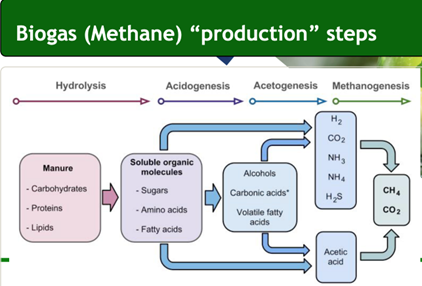
This is the process whereby the digesters work, breaking down complex inputs into a ready-to-use gas
Prof Tinarwo concludes with, “This project is a practical application of circular energy and economy, where rural communities can empower themselves while also protecting the environment.”










